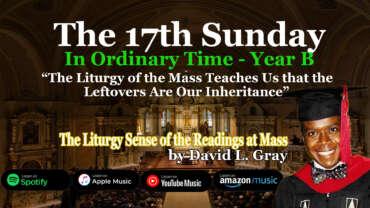
A Commentary and Reflection on the Readings for the 22nd Sunday of Ordinary Time – Year B. The Liturgical Sense of the Scriptures Podcast, by Catholic Author and Theologian David L. Gray. READINGS: Deuteronomy 4:1-2, 6-8, James 1:17-18, 21-22, 27, and Mark 7:1-8, 14-15, 21-23.
The Liturgy of the Catholic Mass Animates our Embodied Soul with the Word of God
Today’s First Reading emerges from a pivotal moment in salvation history. Moses, who had led the Israelites out of Egyptian bondage and through the Red Sea, had spent forty arduous years guiding them in the desert as their prophet and shepherd. Those years were a mosaic of frustrations, rebellions, disappointments, and joys. Despite his unwavering shepherding, Moses himself was barred from entering the Promised Land due to his disobedience to God.[1] Imagine the anguish of journeying so far, enduring so much, only to be denied the culmination of that journey. Even his heartfelt plea to the Lord—”Ah, let me cross over and see the good land beyond the Jordan, that fine hill country, and the Lebanon”—was met with God’s resolute response: “Enough! Speak to me no more of this.”
It is within this poignant and historic backdrop that we arrive at today’s First Reading for the 22nd Sunday in Ordinary Time – Year B, from Deuteronomy 4:1-2, 6-8. Here, Moses delivers his final exhortation to the Israelites, speaking with a heart brimming with love and a sense of unfulfilled destiny. As their spiritual father, he implores them, “Observe them [the commandments of the Lord your God] carefully, for thus will you give evidence of your wisdom and intelligence to the nations.” This teaching that our actions or fruit are the evidence of our obedience to God underscores the imperative that God’s word must transcend mere hearing—it must be lived and embodied.
In light of the pedagogical formation we receive through the Divine Symphony of the Mass, living as if we are transformatively embodied with truth means that we have been made to be spiritually infectious individuals, animated by the Holy Spirit and empowered and invigorated by the Holy Eucharist. Indeed, our participation in the liturgy of the Mass infuses us with the grace to live out our faith boldly in the world, becoming apostles of God’s love and truth.
Today’s Second Reading from James 1:17-18, 21-22, 27 echoes Moses’ farewell charge with a call to action: “Be doers of the word and not hearers only, deluding yourselves.” This directive reinforces the fact that true faith is demonstrated through our actions and through living out the teachings we receive. For, as James would write later in 2:17, “Faith without action is dead.” Indeed, a body that does not have evidence of animation of the Holy Spirit is, by definition, spiritually dead and natural only, rather than supernatural.
In today’s Gospel Reading from Mark 7:1-8, 14-15, 21-23, Jesus underscores this same principle, emphasizing that true purity and righteousness are determined by what resides within a person, rather than mere external observances. He critiques the Pharisees and the scribes for their preoccupation with ritual purity, pointing out that it is not what goes into a person that defiles them, but what comes out from their heart. Jesus’ teaching aligns seamlessly with Moses’ exhortation and James’ admonition, reinforcing the fact that a heart aligned with God’s commands will naturally produce righteous actions. Conversely, an evil heart will manifest in evil deeds, despite any outward show of piety. This call to internal transubstantiation, that is, becoming like what we eat – God becoming man, so that man might become like God, is a profound reminder that the authenticity of our faith is evidenced by the purity of our intentions and the integrity of our actions.
Being a Eucharistic people means that we embrace the liturgical challenge that charges us, as Moses did, to internalize God’s word and allow it to transform our lives and actions in the world around us. For our benefit and grace, the word of God is a living and active person who comes into our minds and hearts as a seed and water and into our bodies as food to nourish our growth. This is what it means to be truly alive, which is the basis of being truly Catholic.
This is just one way the readings at Mass this Sunday connect to the liturgy and how the liturgy is forming us on how to live our lives in the world. Be in the world what you have received through the liturgy.
[1] Cf. Numbers 20.
Hear More of the Audio Version Liturgical Sense of the Readings at Mass, by David L. Gray, or buy the Book, ‘The Liturgical Sense of the Readings at Mass.’
A 2006 convert from Agnosticism, David L. Gray has emerged as a prolific Catholic theologian, author, and humorist. He holds a Bachelor of Science in Business Administration from Central State University, Ohio, and a Master of Arts in Catholic Theology (ThM) from Ohio Dominican University. He is currently pursuing a Doctor of Ministry (DMin) in Liturgical Catechesis at the Catholic University of America. For more information about Mr. Gray, please visit davidlgray.info




